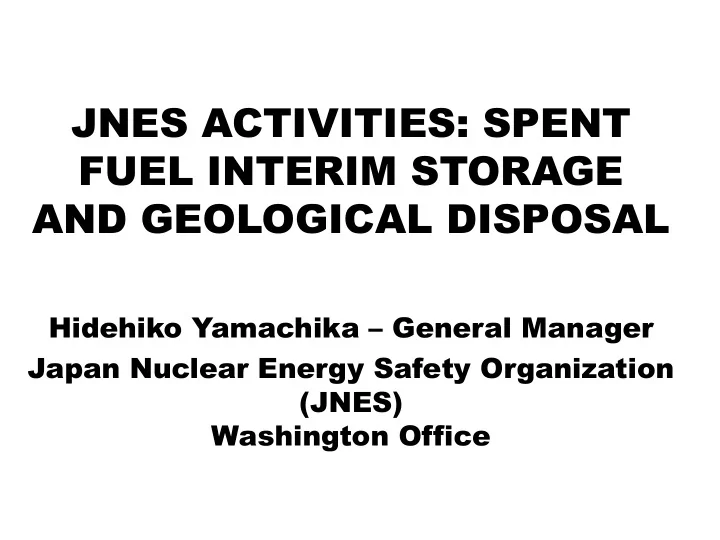

JNES ACTIVITIES: SPENT FUEL INTERIM STORAGE AND GEOLOGICAL DISPOSAL Hidehiko Yamachika – General Manager Japan Nuclear Energy Safety Organization (JNES) Washington Office
Safety Regulation System in Japan ■ Oversight NSC : ■ Notification of Inspection, Nuclear Safety Analysis, etc. NISA : Commission Nuclear and Industrial Safety Agency ■ Quarterly JNES : Reports on ■ Report of Inspection Licensing and Japan Nuclear Energy Results, etc. Inspection ■ Analysis and Evaluation, Safety Organization Support for Emergency (Established on Preparedness and Response, etc. October 1 st , 2003) ■ Application ■ Safety Examination ■ Obligation of ■ Licensing Reporting on Incidents ■ Application and Events ■ Inspection for inspection ■ Safety Management ■ Hearing on Incidents and Events etc. Review ■ Inspection, etc. Licensees 2
Major Programs of JNES (1) • Inspection of nuclear power plants and nuclear facilities • Analysis and evaluation of safety on nuclear power plants and nuclear facilities • Activities for nuclear emergency preparedness and response 3
Major Programs of JNES (2) • Investigation, tests and research to ensure nuclear safety in the framework of utilizing energy • Collection, compilation and supply of information to ensure safety in the framework of utilizing energy 4
Management of Spent Fuel in Japan • Spent fuel is reprocessed. HLW disposed of at geological disposal site. Spent fuel interim storage situation: – Spent fuel generation from NPPs: 13,500 tU in 10 years – Rokkasho reprocessing capacity: 800 tU/year – Additional storage requirement: 7,100 tU 5
Spent Fuel Interim Storage Facility in Japan (1) • Mutsu Interim Spent Fuel Storage Facility (Recyclable- Fuel Storage Center) – Metal cask – Capability: 3,000tU initially; increasing to 5,000tU – Approval of License application: May 13, 2010 – Groundbreaking: July 2010 (business plan) 6
Spent Fuel Interim Storage Facility in Japan (2) • Mutsu facility (continued) – Operation starts: July 2012 (business plan) – Storage period: 50 yrs (business plan) • Regulator safety review confirmed that licensee selected a reliable material that meets safety performance requirements against material degradation for the design basis storage period. 7
Research on Cask Safety, Spent Fuel Integrity During Storage (1) JNES examinations show that metal cask material and spent fuel do not become depleted affecting safety for 40 – 60 years: • Neutron shielding materials for Epoxy resin & Silicon resin • Material property metal gasket for lid Confinement • 9m drop tests for lid containment behavior and seal performance 8
Cask, Spent Fuel Integrity Research (2) JNES examinations (continued): • Thermal tests for lid containment behavior and seal performance • Fuel integrity tests – Thermal creep – Hydride reorientation – Irradiation hardening recovery 9
Regulator Oversight – Geological Disposal Program Circa 2030 Mid-2010 Selection of Preliminary Selection of areas for detailed Selection of the site for Safety Business stage investigation areas investigation repository construction review NUMO open License Literature survey Preliminary investigation Detailed investigation solicitation application (Licensee) ▲ present Review the results of Review the results of Safety NISA Review the results of Preliminary investigation Detailed investigation from review Literature survey from (Regulator) from viewpoint of safety viewpoint of safety viewpoint of safety Research on evaluation Research on technical Research on technical information and method of geological information and background data to environment that supports to JNES Safety research for background data review review to review review (TSO) Research on technical information and background data to establish Guideline of 10 safety review
Regulatory Supporting Research in Geological Disposal (1) • Research on evaluation method of geological environment that supports to review the results of preliminary investigation from viewpoint of safety – Natural Events (faulting, volcanic/magmatic activities, etc.) – Geological environment (geology, hydrology, etc.) 11
Regulatory Supporting Research in Geological Disposal (2) • Research on technical information and background data to establish Guideline of safety review – Evaluation method of geological environment and behavior of natural barrier and engineered barrier system – Evaluation method of safety assessment 12
Organizational Framework: Geological Disposal Safety Research Agreement of cooperative research on safety of geological Universities disposal of radioactive waste (1) sharing research results, (2) exchange of personnel, (3) joint study Advice through the Council Information JAEA exchange AIST -Safety Research Center -Core for Deep Geological Environment ( ex-JAERI) Research (ex-Geological Survey of Japan) Reporting of research results Support to research Nuclear Safety Regulatory Body: Regulatory Support Organization Commission NISA JNES Important safety research plan Information exchange -Information Usage of results exchange after check - Joint research Utilities, etc. - Electric power companies - NUMO Governmental Regulatory agencies and programs for basic regulatory support research organizations in overseas (IRSN, KINS, GRS, etc.) 13
For the Future … • We hope to have a cooperative safety research agreement in the field of radioactive waste management with NRC under the NRC-NISA framework agreement. • In particular, we hope to exchange information on long- term safety. 14
Acronyms AIST National Institute of Advanced Industrial Science • and Technology Gesellschaft für Anlagen- und Reaktorsicherheit GRS • Institut de Radioprotection et de Sûreté Nucléaire IRSN • Japan Atomic Energy Agency JAEA • Japan Nuclear Energy Safety Organization JNES • Korea Institute of Nuclear Safety KINS • Nuclear and Industrial Safety Agency NISA • Nuclear Safety Commission NSC • Nuclear Waste Management Organization of Japan NUMO • Technical support organization TSO • 15
Recommend
More recommend